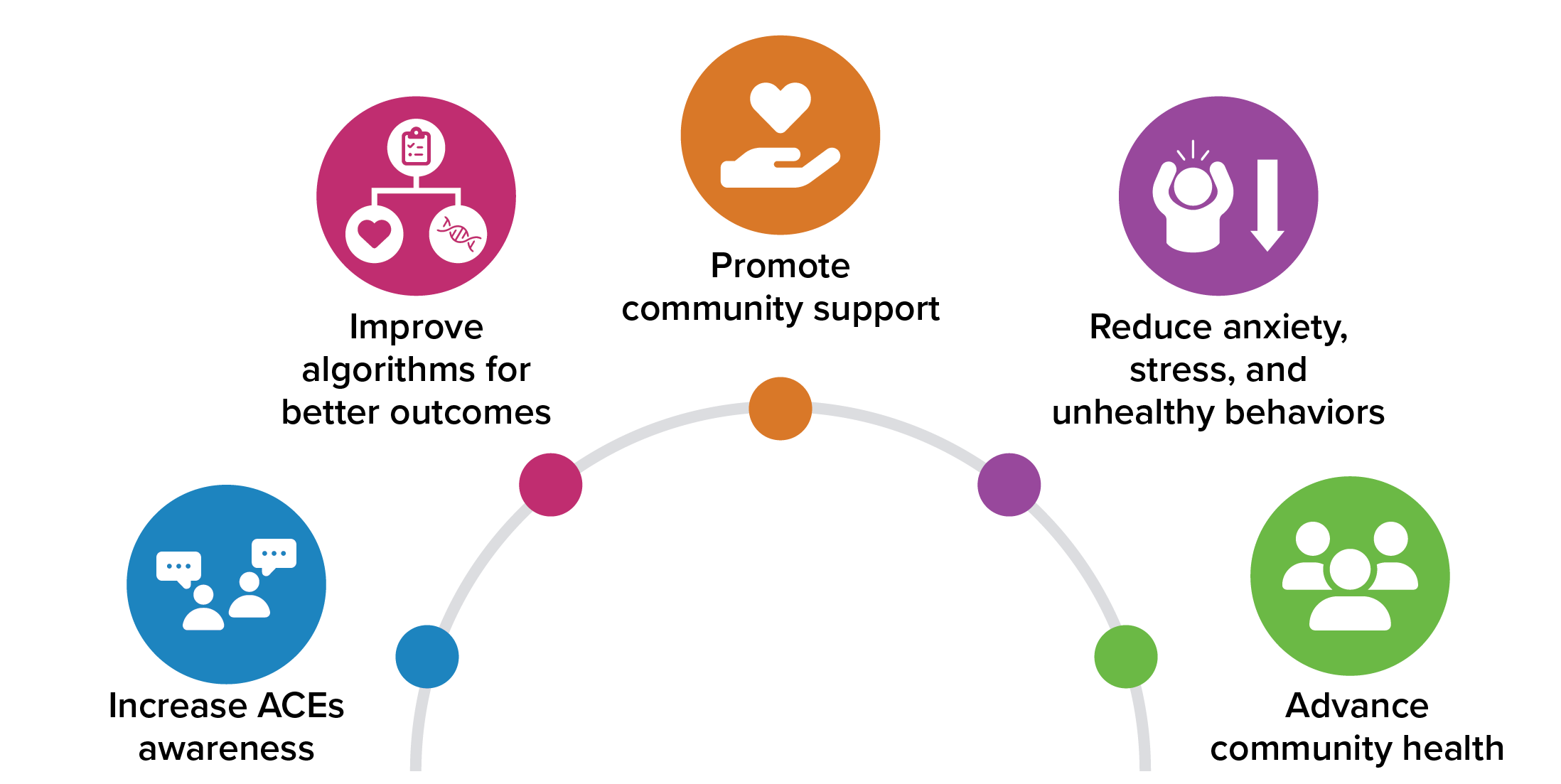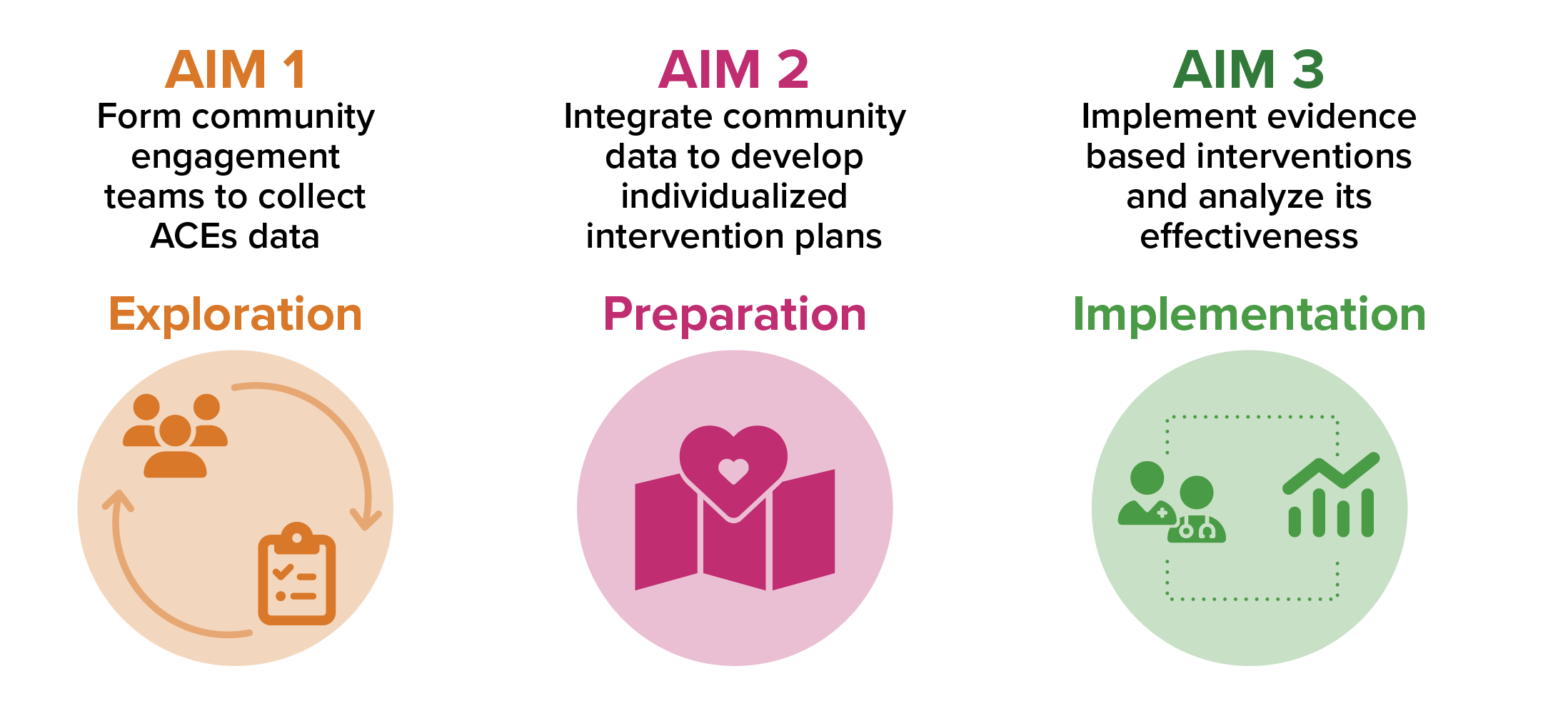California Initiative to Advance Precision Medicine Advancing a Precision Population Health Approach to ACEs to Reduce Health Disparities
Adverse Childhood Experiences demonstration project led by Dr. Gary S. Firestein at UC San Diego (2021-2024).
Project Summary
This project seeks to:
Background
Children with Adverse Childhood Experiences (ACEs) may benefit from interventions to mitigate the negative health effects of prior trauma. Many communities, especially underserved ones, face the challenge of fragmented health and education systems that often fail to accommodate the needs of families.
Members of the community, known as Community Health Workers (CHWs), can provide health care services and support to their fellow community members. CHWs usually share ethnicity, language, socioeconomic status, and life experiences with the community members they serve. They are known by many titles: community health advisors, lay health advocates, promotoras or promotores, outreach educators, community health representatives, peer health promoters, and peer health educators. They play an important role as a link between a community and the health care system, performing a wide range of activities including peer education, counseling, referral assistance, and direct clinical care such as blood pressure screening. In childhood health, CHWs can serve critical roles by linking families with community resources and assisting them in navigating the health care system.
The team aims to approach the health impacts of ACEs, stress, and obesity using a community-based approach.
Project Goals


The team aims to address ACE-related health problems among Latino families in the San Diego area by implementing a community-based, precision approach that improves the resiliency of individuals and communities to the health impacts of stress and obesity. The team is implementing a community-designed intervention tailored to different families, according to their unique needs.
To achieve this goal, the team is collaborating with community partners in three distinct phases. During the first phase, the team formed Community Engagement Teams (CETs), led by local partners and CHWs, to decide which interventions addressing childhood obesity and family resilience study participants prefer and find most useful. During the second phase, the team is co-designing a system to continuously learn and adapt how they deliver interventions. Finally, in the implementation phase, families participate in the new interventions and the team evaluates their effectiveness.
Before initiating any interventions, the CETs and researchers are co-designing a Community Data Integration System to tailor the interventions to families, and to allow the researchers to continuous learn and refine their approaches.
The community-centered research team and CETs are studying the effectiveness of their interventions against standard forms of care, as they are implemented. The goal is that these family-based, trauma-informed interventions will manage ACEs, positively influence family interactions, and improve self-regulatory skills. At the same time, these interventions will also change behaviors that lead to obesity, such as diet and physical activity. The CETs will also select and refine the outcomes that are most important to them. At the end of the study, the team will record and share their learnings and best practices with local, regional, and state organizations.
Lastly, the team is also working towards determining how assessments of molecular markers and environmental influences might correlate with health outcomes, which they hope will help inform family care best practices.
Team Leaders
Senior Associate Vice CHancellor for Health Sciences
UC San Diego
Dr. Gary S. Firestein is Director of the Altman Clinical and Translational Research Institute (ACTRI) and the Senior Associate Vice Chancellor for Health Sciences at UC San Diego (UCSD). Dr. Firestein joined the faculty at UCSD School of Medicine as assistant professor of Medicine in 1988. Four years later, he was recruited by Gensia, Inc. to be director of immunology.
In 1996, he returned to UCSD where he served as chief of the Division of Rheumatology, Allergy and Immunology. In 2008, he became the dean of Translational Medicine. In 2010, he became associate vice chancellor of translational medicine and director of ACTRI. He is the co-creator of the University of California’s CTSA consortium UC Braid.
Dr. Firestein's research interest focuses on the pathogenesis and treatment of rheumatoid arthritis (RA). He was among the first to map the cytokine profile of RA and demonstrate the dominance of macrophage and fibroblast products, playing a pivotal role in the development of highly effective anti-TNF and anti-cytokine therapies for RA. More recently, his research has included evaluation of immune dysfunction in individuals at risk for developing rheumatoid arthritis.
Dr. Firestein completed undergraduate studies at Harvard University and earned his MD at Johns Hopkins University.
Hebert Wertheim School of Public Health and Human Longevity Science
UC San Diego
Dr. Eric Hekler is Professor & Interim Associate Dean, Community Partnerships, in the Herbert Wertheim School of Public Health and Human Longevity Science at UCSD, the Director of the Center for Wireless & Population Health Systems within the Qualcomm Institute at UCSD, and past Interim Director and faculty member of the Design Lab at UCSD. Dr. Hekler is a transdisciplinary researcher, educator, and practitioner who works at the intersection of public health, health psychology, design, and control systems engineering. His mission is to advance methods and processes that equitably serve people and practice towards a more vital, just, and resonantly diverse society and planet.
He works towards this via advancing research methods and processes in the areas of: 1) optimizing adaptive behavioral interventions; 2) helping people help themselves: and 3) facilitating compassionate, anti-oppressive, systems-oriented collective action. Dr. Hekler has played an integral role in creating new transdisciplinary educational opportunities and programs at UCSD, and is an active public health practitioner in the San Diego region. He is recognized internationally as an expert in applied health science methods and digital health.
Dr. Hekler earned a BA in Psychology from University at Albany, and an MA and PhD in Clinical Psychology from Rutgers University.
UCSD Center for Community Health (CCH)
Blanca Meléndrez is the Executive Director for the UCSD Center for Community Health (CCH) and Co-Chair for the UCSD Healthy Campus Network. Through this work, she adheres to leadership values that encompass a racial equity lens and leads collective community-wide efforts to enact policy, systems, and environmental changes aimed at impacting social determinants of health for underserved populations. Blanca has extensive experience in executive level program oversight, community engagement, community-based initiatives, human resources, project management, public relations, and marketing. These skills have been instrumental in securing over $40 million in funding and services for CCH and aiding its development over the past 20 years.
With her team, Blanca has developed new programs from the ground up such as Worksite Wellness, Faith-based Wellness, Healthy Retail, Food Systems, and Southern California Nutrition Incentive Program: ¡Más Fresco! More Fresh. Under her leadership, CCH launched Refugee Unite and a Youth Advisory Council. These programs are comprised of passionate young people and community advocacy leaders dedicated to improving access to education, economic mobility and health for those communities that have experienced historical and systemic health inequities.
Blanca holds BAs in Political Science and Latin American Studies, and a MA in Literature from UCSD.
UC San Diego School of Medicine
Dr. Rhee is a Professor of Pediatrics and Vice Chair of Equity, Diversity, and Inclusion at UC San Diego School of Medicine, Chief of the Division of Child and Community Health, and is Medical Director for the Medical Behavioral Unit at Rady Children’s Hospital San Diego and the UCSD Center for Healthy Eating and Activity Research. She specializes in childhood eating and weight related disorders and has received multidisciplinary training in childhood obesity treatment, behavior modification, parenting skills training, motivational interviewing, epidemiology, and social psychology. She conducts research on the intersection of biology, cognition, and behavior and how they affect child development and health. Her work focuses on identifying novel targets for obesity prevention and treatment including parenting styles, parent feeding behaviors, child eating behaviors, executive functioning, and the microbiome. Over the past several years, her work has expanded to include social determinants of health targets and food insecurity.
Partners, Collaborators, and Supporters
- American Academy of Pediatrics California Chapter 3
- Pradeep Gidwani, MD, MPH
- Chicano Federation
- Lupe Flores
- Joel Ortiz
- Comité Organizador Latino de City Heights (COLCH)
- Maribel Arias
- Family Health Centers of San Diego
- Job Godino, PhD
- Cynthia Juarez Nunez, MPH
- Deisy Celis
- Yarian Abitia, BS
- Dulce Calzado
- Olivewood Gardens and Learning Center
- Patty Corona
- Jennifer Nation
- Kitchenistas
- Patty Corona
- Poder Popular
- Michelle Sevilla-Zepeda, MPH
- San Diego County Childhood Obesity Initiative
- Liliana Osorio, MPH
- Shana Wright, MPH, CLEC
- San Diego County Promotores Coalition
- Margarita Holguin
- San Diego State University
- Dr. Noe Crespo, PhD
- StreetWyze
- Antwi Akom
- Aluna Jaden Torres
- Tessa Cruz
- South Bay Community Services
- Rachel Pinuelas-Morineau
- Vista Community Clinic
- Nannette Stamm, MPH
- YMCA Partners in Prevention

